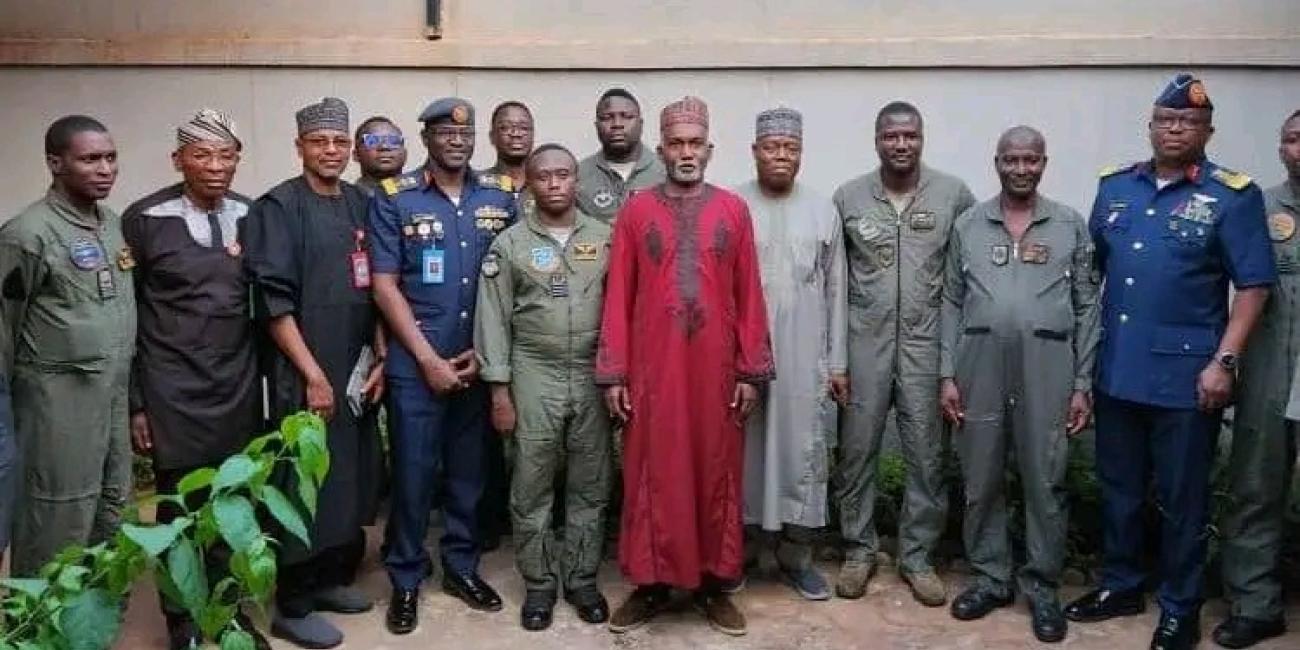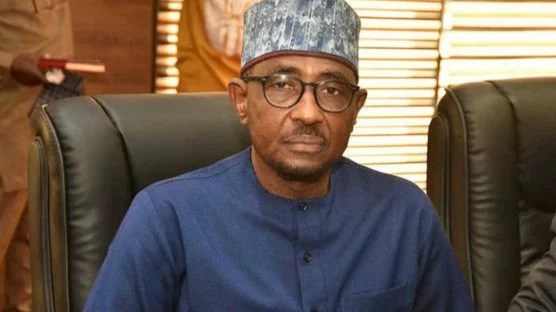Headlines
The Efik Queen is Right About Post-COVID Democracy – Here’s Why

Joel Popoola
As the leader of a campaign to modernise democracy in Nigerian, I might be expected not to agree too much with one of our nation’s countless local monarchs – institutions many Nigerians believe to be an archaic and outdated relic of a bygone era.
But a recent interview with the Queen of Efik contained some interesting thoughts about how our democratic processes should adapt to the post-Covid world which really struck a chord with me.
In an interview with the BBC, the Queen argues that democratic bodies should continue to hold meetings remotely – even after the end of social distancing and restrictions on movement necessitated by the coronavirus crisis.
The Queen combines her role with a day job in Lagos, returning to Calabar for council meetings which have always required members to be physically present.
COVID-19 has made this requirement impossible, and meetings have been convened online for much of the past year. The queen argues that council members should be able attend meetings remotely even after the end of the current crisis.
One of the few positives of the past twelve months has been the rapid uptake of digital technology from people who used to say they “didn’t do computers”. This can be very positive for our democracy, and here are five reasons why I believe the Queen is right.
1. Remote meetings can make political bodies look more like Nigeria
Our political class is overwhelmingly made up of men over fifty, which can make it seem out of touch and irrelevant to the huge swathes of our population who are not. And I say that as a man over fifty!
A significant reason for this is that working age Nigerians and those with caring commitments – the majority of whom are women – are unable to take on the additional commitments of political office. Not requiring them to travel, take time off from work or make alternative childcare commitments every time they need to attend a meeting, when they could just as easily attend from home or work, is a simple step we can take to bring about a more representative political class.
2.Remote meetings mean that politics will not just be done, but be seen to have been done.
Many Nigerians do not see that the majority of their local leaders are motivated by public service and a love of their communities, because they do not see them at all. Making more public meetings digital makes is much easier for members of the public to attend them using their mobile phones – or at a time that suits them if these meetings are recorded and streamed.
3. Remote meetings improve transparency
Likewise, there can be no claims of shady backroom deals and stitch-ups if a recording of the political process is recorded for posterity and made available permanently. Remote meeting technology makes this process incredibly simple.
4. Remote meetings are good for recognition
Like it or not, may Nigerians simply have no idea who their local leaders are. Remote meetings make it a lot easier for electors to identify their elected representatives, and to see them in action.
5. Remote meetings enhance accountability
Many local councils have a public question time, allowing local people to put their questions directly to decision makers. But the need to take time off from work and other commitments to travel to meetings to take advantage of this system renders is practically useless for many Nigerians. Again, being able to take advantage of this system from their comfort of their home or workplace strengthens accountability.
Another interesting argument made by the Queen of Efik is that traditional kings and queens are simply closer to the people than elected representatives due to their longstanding personal networks.
This is certainly an area local politicians need to work on, and at the digital democracy campaign I lead we have set out to provide them with the technology that enables the rapid development of those networks and relationships.
We created a free smartphone app called Rate Your Leader to allow elected officials to interact directly with confirmed voters in the divisions they serve.
Rate Your Leader (https://play.google.com/store/apps/details?id=com.rateyourleader.voter2 )” allows politicians and people can engage person-to-person, understanding each other’s needs and positions, communicating as peers, and collaborating as equals to make their communities better. Our abuse-proof technology ensures that conversations are always courteous and civil.
And Rate Your Leader even lets voters rate their politicians for their transparency and accessibility.
As the Queen points out, Nigerians are “very happy when people send them money online or by phone” – so why don’t we use that same technology to revitalise our democracy?
Joel Popoola is a Nigerian tech entrepreneur, digital democracy campaigner and creator of the Rate Your Leader app. Follow Joel on Twitter @JOPopoola
Headlines
Free at Last: Burkina Faso Releases 11 Nigerian Soldiers

Burkina Faso has released Nigerian soldiers who were detained after their aircraft made a forced landing in the Sahelian country earlier this month, Nigerian officials said.
In a statement, Alkasim Abdulkadir, Tuggar’s spokesperson, said both sides resolved the matter amicably and secured the release of the Nigerian Air Force pilots and crew.
The soldiers had been held for nearly two weeks after the Confederation of Sahel States (AES) described the aircraft’s landing as an “unfriendly act” carried out in defiance of international law.
The Nigerian Air Force, however, said the crew encountered a technical issue that required a precautionary landing in Bobo-Dioulasso, the nearest available airfield. It said the landing complied with standard safety procedures and international aviation protocols.
Headlines
Corruption Allegations: NMDPRA Boss Farouk Ahmed Meets Tinubu, Resigns

The Chief Executive Officer (CEO) of the Nigerian Midstream and Downstream Petroleum Regulatory Authority (NMDPRA), Farouk Ahmed, has resigned following a meeting with President Bola Tinubu amid corruption allegations.
Tinubu, on Wednesday, summoned Ahmed to the Presidential Villa in Abuja, following allegations of economic sabotage and corruption.
Also caught in the web of resignation was the CEO of the Nigeria Upstream Petroleum Regulatory Commission (NUPRC), Gbenga Komolafe, according to a statement on Wednesday by Bayo Onanuga, special adviser to the president on information and strategy.
Tinubu was said to have nominated successors to the senate for approval.
“Tinubu has asked the Senate to approve the nominations of two new chief executives for the Nigerian Midstream and Downstream Petroleum Regulatory Authority (NMDPRA) and the Nigerian Upstream Petroleum Regulatory Commission (NUPRC),” the statement reads.
“The requests followed the resignation of Engineer Farouk Ahmed of the NMDPRA and Gbenga Komolafe of the NUPRC.
“Both officials were appointed in 2021 by former President Buhari to lead the two regulatory agencies created by the Petroleum Industry Act (PIA).
“To fill these positions, President Tinubu has written to the Senate, requesting expedited confirmation of Oritsemeyiwa Amanorisewo Eyesan as CEO of NUPRC and Engineer Saidu Aliyu Mohammed as CEO of NMDPRA.”
Onanuga said the two nominees are seasoned professionals in the oil and gas industry.
Headlines
I’m Ready for Probe, NMDPRA Boss Farouk Ahmed Responds to Dangote’s Corruption Allegation

The Chief Executive Officer of the Nigerian Midstream and Downstream Petroleum Regulatory Authority (NMDPRA), Engr. Farouk Ahmed, has responded to recent claims regarding the financing of his children’s education and his integrity in office, insisting that the allegations are misleading and ill-timed.
Ahmed said the allegations “necessitated this response, not because I fear scrutiny of my finances, which I welcome, but because the timing and nature of these claims demand context that only three decades of public service can provide.”
Ahmed highlighted his career in Nigeria’s petroleum sector, which began in 1991, noting that he rose through merit rather than political patronage.
He recalled his experience across technical divisions, crude oil marketing, gas supply monitoring, and downstream operations, stressing that his decisions have always been guided by Nigeria’s national interest.
“I spent my formative years in the technical divisions, where decisions are measured not by political expediency but by engineering precision and market realities,” he said.
He further outlined his rise to General Manager of the Crude Oil Marketing Division in 2012 and later Deputy Director in 2015, before being appointed NMDPRA Chief Executive in 2021.
On assuming the role, Ahmed said, he understood the challenges of implementing reforms under the Petroleum Industry Act, acknowledging that enforcing transparency in a sector long characterised by opacity would inevitably meet resistance.
Addressing the allegations about his children’s education, Ahmed said the claim that he spent $5 million on their Swiss schooling was misleading. “Three of my four children received substantial merit-based scholarships ranging from 40% to 65% of tuition costs, verifiable information are available to any authorised investigation,” he said, adding that contributions from his late father, a Northern Nigerian businessman, further supported the education costs.
He added: “When scholarships, family contributions, and my own savings accumulated over three decades are properly accounted for, my personal financial obligation was entirely consistent with someone of my professional standing and length of service.”
Ahmed confirmed that his annual compensation of approximately N48 million, including allowances, is publicly documented, and that he has submitted detailed asset declarations to the Code of Conduct Bureau throughout his career.
The CEO also linked the timing of the allegations to recent regulatory actions taken by NMDPRA.
“These allegations resurface precisely when NMDPRA has enforced quality standards revealing substandard petroleum products in the market, implemented stricter licensing requirements, and insisted on transparent pricing mechanisms that eliminate opacity benefiting certain market players. This timing is not coincidental,” Ahmed said.
He defended the authority’s import licensing decisions, emphasizing that they comply with Section 7 of the Petroleum Industry Act, which mandates supply security and prevention of scarcity.
“Granting import licenses when domestic supply proves insufficient is not sabotage, it is our legal duty,” he said.
Ahmed invited formal investigations into his finances and tenure, stating: “I formally and publicly request the Code of Conduct Bureau to conduct comprehensive review of all my asset declarations since 1991, the Economic and Financial Crimes Commission to examine all my financial transactions and sources of income, and the National Assembly to exercise its oversight function regarding any allegations of regulatory compromise during my tenure. I will cooperate fully, provide all documentation, and answer all questions under oath if required.”
Concluding, Ahmed reaffirmed his commitment to regulatory independence and transparency.
“Three decades of service to Nigeria’s petroleum sector have taught me that integrity is tested not in comfortable moments but when powerful interests demand compromise. My response is simple: investigate thoroughly, examine every claim, scrutinize every transaction. My record both financial and professional will withstand any legitimate inquiry.”






